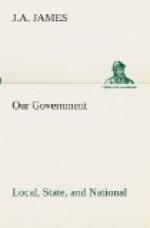The New Government Put into Operation.—When the ratification of the ninth State had been secured, Congress appointed a special committee to frame an act for putting the Constitution into operation. It was enacted that the first Wednesday in January should be the day for appointing electors; that the electors should cast their votes for President on the first Wednesday in February, and that on the first Wednesday of March the new government should go into operation. It was not until April 1 that a quorum was secured in the House of Representatives, and in the Senate not until April 6. The electoral votes were counted in the presence of the two houses on April 6.[10] The inauguration of President Washington did not take place, however, until April 30.
[Footnote 10: New York did not choose electors. North Carolina and Rhode Island, as we have seen, had not ratified the Constitution.]
Origin of the Constitution.—Before making a study of this epoch-making document, let us inquire briefly as to its origin. An analysis of the Constitution shows that there are some provisions which are new and that English precedent had an influence. The main features, however, were derived from the constitutions of the States with whose practical workings the delegates were familiar. The following well-known statement is an excellent summary: “Nearly every provision of the Federal Constitution that has worked well is one borrowed from or suggested by some State constitution; nearly every provision that has worked badly is one which the convention, for want of a precedent, was obliged to devise for itself.”
Authority and Objects of the Constitution.—It was evidently the intention of the framers of the Constitution to found a government deriving its authority from the people rather than from the States. The purposes for which this was done are set forth in the following enacting clause, commonly called the preamble:—
“We, the people of the United States, in order to form a more perfect union, establish justice, insure domestic tranquility, provide for the common defense, promote the general welfare, and secure the blessings of liberty to ourselves and our posterity, do ordain and establish this Constitution for the United States of America.”




